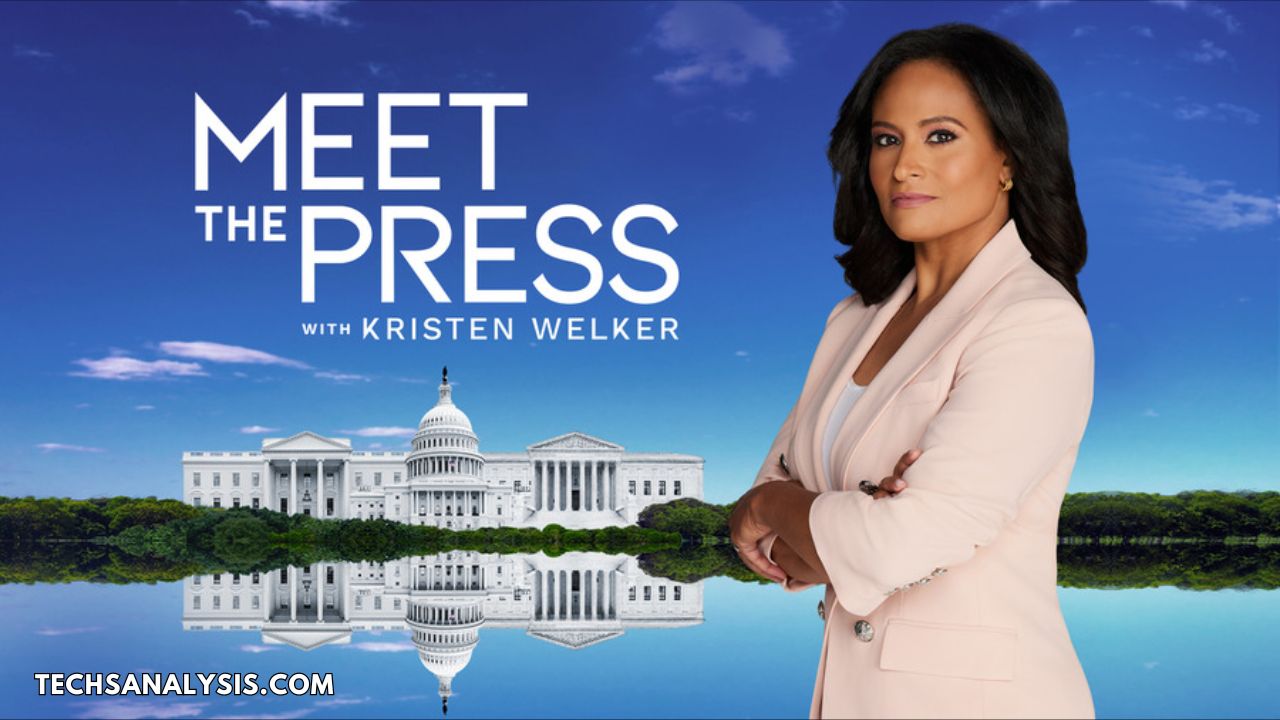Comprehensive analysis of Meet the Press S76E35: Key discussions on domestic policy, economic recovery, international relations, and cybersecurity.
Introduction
For decades, Meet the Press has been a defining platform in American journalism, providing an arena where influential figures in politics, media, and public life come together to discuss pressing national and international issues. Season 76, Episode 35 of this storied program continues this tradition, bringing to the forefront key discussions on topics that shape our world today. This article offers a detailed analysis of the episode, exploring the significant themes, the expert insights provided, and the broader implications for current and future discourse.
Table of Contents
The Legacy of Meet the Press
Meet the Press holds a unique position in American media history. Since its inception in 1947, the program has evolved into a vital platform for political discourse, offering a stage for presidents, policymakers, and public intellectuals to speak directly to the American public. Its long-standing commitment to rigorous journalism and its role in shaping public opinion have made it a cornerstone of democratic engagement.
A Brief History of Meet the Press
Meet the Press was first broadcast on November 6, 1947, created by journalist Martha Rountree, who was also its first moderator. Initially conceived as a platform where reporters could question prominent newsmakers, it quickly became an essential venue for political leaders. Over the years, the show has adapted to the changing media landscape but has always maintained its focus on providing in-depth interviews and thoughtful panel discussions.
The Influence of Meet the Press on American Politics
The influence of Meet the Press extends far beyond its weekly broadcasts. The program has been the setting for historic interviews with every sitting U.S. president since John F. Kennedy. Discussions on the show often set the tone for national debates, influencing both public opinion and policy-making. Season 76, Episode 35 is a continuation of this legacy, reflecting the current challenges and opportunities in American and global politics.
Season 76, Episode 35: An Overview

Season 76, Episode 35 of Meet the Press aired during a time of significant political and social upheaval. The episode brought together a diverse panel of guests, including political leaders, analysts, and experts, to discuss a range of critical issues. The conversations covered domestic policy, economic recovery, international relations, and more, offering viewers a comprehensive understanding of the current state of affairs.
The Context of the Episode
This episode aired in a period marked by numerous challenges: the ongoing recovery from the COVID-19 pandemic, debates over economic policy, issues of racial justice, and international tensions. The Biden administration was navigating a polarized political landscape, and the episode reflected the complexities of governing in such a context.
The Guest Panel
The guest panel for this episode included influential figures from various fields, each bringing their expertise and perspective to the discussions. Their insights ranged from detailed policy analysis to broader reflections on the state of democracy in the United States and around the world.
Episode Structure
The episode was structured to allow for an in-depth exploration of several key topics. Each segment focused on a specific area, ensuring that the discussions were thorough and informative. The seamless transition between topics underscored the interconnectedness of the issues at hand, offering viewers a holistic understanding of the challenges facing the nation.
Key Themes and Discussions
The episode delved into several critical themes, each of which was explored in detail to provide a nuanced understanding of the issues.
Domestic Policy and Governance
Domestic policy was a central focus of the episode. The discussions revolved around the current state of American governance, with particular attention to healthcare, education, and legislative challenges.
The State of American Governance
The episode began with an analysis of recent legislative efforts and executive actions aimed at addressing key issues such as healthcare, infrastructure, and education. The panelists discussed the challenges faced by the Biden administration in navigating a divided Congress and securing bipartisan support for its initiatives.
Legislative Challenges and Achievements
The panel examined the difficulties of pushing through significant legislation in a politically polarized environment. They discussed various bills that had been proposed or passed, highlighting both the successes and the setbacks. The conversation emphasized the importance of bipartisan cooperation in achieving meaningful policy changes.
Executive Actions and Their Impact
In addition to legislative efforts, the episode also explored the executive actions taken by the Biden administration. These actions ranged from executive orders on climate change to measures aimed at expanding healthcare access. The panelists debated the effectiveness of these actions and their potential long-term impact on American politics and society.
Healthcare Reform
Healthcare remains one of the most contentious issues in American politics. The episode featured a robust discussion on recent proposals to reform the healthcare system, focusing on the need for affordable and accessible care.
The Affordable Care Act and Future Reforms
The panel revisited the ongoing debate over the Affordable Care Act (ACA), discussing its successes and limitations. They explored the Biden administration’s efforts to expand ACA coverage and the challenges posed by opposition efforts to repeal or undermine the law. The conversation also touched on alternative proposals, such as Medicare for All, and the feasibility of such sweeping reforms.
Public vs. Private Healthcare
A significant part of the healthcare discussion centered on the role of public versus private healthcare. The panelists debated the merits of a single-payer system compared to a mixed system that includes both private insurance and public options. They considered the trade-offs in terms of access, cost, and quality of care, and the implications for patients and providers.
Education Policy
Education policy was another critical topic of discussion. The panel examined the state of the American education system, particularly the disparities in funding and resources across different regions.
Addressing Educational Inequities
The discussion highlighted the persistent inequities in the American education system, particularly the disparities in funding between wealthy and impoverished school districts. The panelists explored the impact of these inequities on student outcomes and considered potential policy solutions, including federal funding initiatives and state-level reforms.
The Impact of COVID-19 on Education
The COVID-19 pandemic has significantly impacted education, and the episode delved into the challenges and changes brought about by the pandemic. The panelists discussed the shift to remote learning, the digital divide that has exacerbated educational inequalities, and the long-term implications for students and educators. They also considered the potential for lasting changes in education, including the increased role of technology in the classroom.
Economic Recovery and Policy
The economic challenges and opportunities facing the United States were another major focus of the episode. The panelists discussed the ongoing recovery from the COVID-19 pandemic, the role of infrastructure investment in driving economic growth, and the implications of proposed tax policies.
The Economic Recovery Post-Pandemic
The episode provided a detailed examination of the current state of the U.S. economy, with a particular focus on the recovery from the COVID-19 pandemic. The panelists assessed the effectiveness of government stimulus measures and discussed the prospects for sustained economic growth.
Government Stimulus and Economic Growth
The panel explored the various stimulus measures implemented by the Biden administration, including direct payments to individuals, expanded unemployment benefits, and support for small businesses. They debated the long-term implications of these measures for the federal deficit and inflation, as well as their impact on the overall economy.
The Labor Market and Unemployment
Unemployment was a central topic of the economic discussion. The panelists examined the factors contributing to persistent unemployment, including the mismatch between available jobs and the skills of the unemployed. They also discussed the challenges faced by specific sectors, such as hospitality and retail, and the potential solutions to these issues.
Infrastructure Investment
Infrastructure investment was highlighted as a key driver of economic growth. The panelists discussed the Biden administration’s infrastructure proposals, including the potential benefits of modernizing transportation, energy, and communications systems. They also considered the challenges of funding such large-scale projects and the political hurdles to securing bipartisan support.
The Future of Infrastructure in America
The discussion on infrastructure extended beyond immediate proposals to consider the future of infrastructure in America. The panelists debated the need for long-term investments in sustainable and resilient infrastructure, particularly in the face of climate change. They also explored the potential for new technologies to transform infrastructure and enhance economic productivity.
International Relations and Security
International relations and security were also significant themes in the episode. The panelists discussed the challenges facing the United States on the global stage, including rising tensions with China and ongoing cybersecurity threats.
U.S.-China Relations
The episode featured an in-depth discussion on the state of U.S.-China relations, a critical issue in global geopolitics. The panelists explored the economic, political, and military dimensions of the relationship, including the implications for global trade, security, and human rights.
Economic Competition and Trade
The panelists discussed the economic competition between the U.S. and China, particularly in the areas of technology and trade. They considered the impact of tariffs and trade policies on both economies and the broader global market. The conversation also touched on the importance of innovation and technological leadership in maintaining a competitive edge.
Military Tensions and Security Concerns
The discussion on U.S.-China relations also addressed military tensions and security concerns. The panelists examined the potential for conflict in regions such as the South China Sea and Taiwan, as well as the broader implications for global security. They also considered the role of diplomacy and international alliances in managing these tensions.
Cybersecurity Threats
Cybersecurity was another critical topic of discussion, reflecting the growing threat of cyberattacks on governments, businesses, and individuals. The panelists discussed recent high-profile cyber incidents, the vulnerabilities in current systems, and the need for stronger cybersecurity measures.
Government and Private Sector Collaboration
The panel emphasized the importance of collaboration between the government and the private sector in addressing cybersecurity threats. They discussed the challenges of coordinating efforts across different industries and the need for comprehensive cybersecurity policies that protect critical infrastructure and sensitive data.
The Future of Cybersecurity
The conversation on cybersecurity also looked to the future, considering the evolving nature of cyber threats and the need for innovative solutions. The panelists explored the potential for new technologies, such as artificial intelligence, to enhance cybersecurity and the importance of international cooperation in combating cybercrime.
Conclusion
Meet the Press Season 76, Episode 35 was a comprehensive exploration of the most pressing issues facing the United States and the world today. From domestic policy and economic recovery to international relations and cybersecurity, the episode provided viewers with valuable insights and a deeper understanding of the challenges and opportunities that lie ahead. As always, Meet the Press continues to be a vital platform for informed discussion and thoughtful analysis, contributing to the ongoing dialogue that shapes our world.

